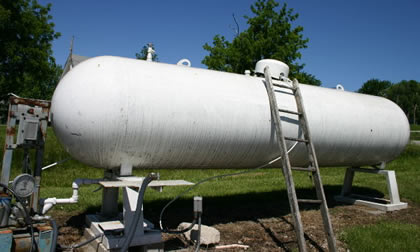Cost Effective Propane for Space Heating
While the majority of remote homesteads rely on wood burning stoves and furnaces for heating in the winter, there are benefits to having a propane heater as backup.
They are handy for those times when you need additional localized warmth or for compensating for particularly long and cold winters that deplete the wood supply faster than you were expecting.
In this article I'll be looking at why you would want to have this kind of heat source especially when wood is often the most plentiful (and usually free for the taking) fuel source for homesteaders.
Easy Storage and Convenient
 The beauty of propane is that it can be stored safely in a garage or weatherproof shed.
The beauty of propane is that it can be stored safely in a garage or weatherproof shed.
It comes in suitable sized canisters ranging from small one pound cylinders for the smaller portable heaters right up to large permanently installed repositories that hold many gallons of the liquid gas fuel.
Its other major benefit is that it provides instant warmth as soon as the heater is turned on. This, in some circumstances such as coming in from a long spell in the freezing cold can be a very welcome plus point indeed.
Cost Effective Fuel
Propane heaters are relatively cheap to buy and will last a long time.
This makes them popular with homesteaders who like to have a backup heating option for emergencies or just to provide additional heat when the home's main source is not able to cope effectively enough with a particularly cold period.
The heaters come in a range of sizes from small portable units right up to large permanently fixed furnaces. There is a suitable sized one for every household.
With fuel prices rising in all areas, the cost of keeping propane as an alternative fuel is more affordable these days too. The only fuel that is considerably cheaper is wood in areas where this resource is plentiful and easily accessible, with most homesteads enjoying this benefit, but not all.
Even Free Wood is Not Free!
Of course there is still the labor cost of harvesting, seasoning, chopping and storing the large volume of wood needed by even the smaller homesteads in areas that experience long cold winters.
When you factor in your time and give it a cost per hour even at minimum wage, the true cost of using this "free" fuel is revealed and is often more costly than other "bought" fuels such as propane or coal.
In any event, the convenience and safety of having one or more propane heaters available for use on a remote home usually outweighs the purchase cost. The very fact that you can have one or more of these on standby if disaster strikes and you run out of wood before the cold weather finishes or if your furnace breaks down for some reason, makes this an option worth considering.
Of course it would be tough trying to convince those who are determined to only use what nature has provided for them on their land in wood that propane is a viable alternative. But as a complimentary backup fuel, it has plenty of merits for sure.
Here is some more information on alternative fuels: Alternative Fuels Data Center and prices: Weekly Heating Oil and Propane Prices